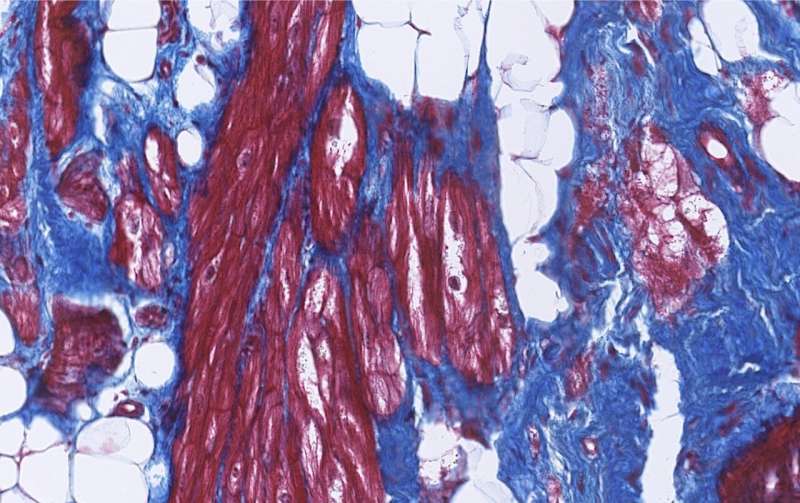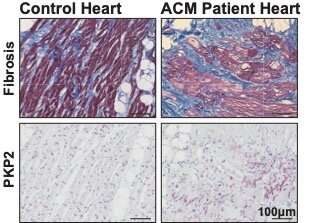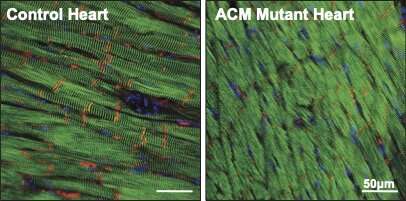This article has been reviewed according to Science X's editorial process and policies. Editors have highlighted the following attributes while ensuring the content's credibility:
fact-checked
peer-reviewed publication
trusted source
proofread
From mutation to arrhythmia: Desmosomal protein breakdown as an underlying mechanism of cardiac disease

Mutations in genes that form the desmosome are the most common cause of the cardiac disease arrhythmogenic cardiomyopathy (ACM), which affects one in 2,000 to 5,000 people worldwide. Researchers from the group of Eva van Rooij now discovered how a mutation in the desmosomal gene plakophilin-2 leads to ACM. They found that the structural and functional changes in ACM hearts caused by a plakophilin-2 mutation are the result of increased desmosomal protein degradation. The findings of this study, published in Science Translational Medicine on March 22, 2023, further our understanding of ACM and could contribute to the development of new therapies for this disease.
ACM is a progressive and inheritable cardiac disease for which currently no treatments exist to halt its progression. Although patients initially do not experience any symptoms, they are at a higher risk of arrhythmias and resulting sudden cardiac arrest. As the disease progresses, patches of fibrotic and fat tissue form in the heart which can lead to heart failure. At this stage, patients require a heart transplantation as treatment.
Plakophilin-2
More than 50% of all ACM cases are caused by a mutation in one of the desmosomal genes, which together form complex protein structures known as desmosomes. Desmosomes form "bridges" between individual heart muscle cells, allowing the cells to contract in a coordinated manner. Most of the desmosomal mutations that cause ACM occur in a gene called plakophilin-2. Nevertheless, very little is known on how mutations in this gene lead to the disease.
To change this, the Van Rooij lab first studied human heart samples from ACM patients carrying mutations in the plakophilin-2 gene. "We saw lower levels of all desmosomal proteins and disorganized desmosomal proteins in fibrotic areas of the ACM hearts," says Jenny (Hoyee) Tsui, first author on the paper. "In addition, cultured 3D heart muscle tissue originating from a patient with a plakophilin-2 mutation, was unable to continue beating at higher pacing rates, which resembles arrhythmias seen in the clinic," she said.
ACM in mice
The researchers then used a genetic tool called CRISPR/Cas9 to introduce the human plakophilin-2 mutation in mice to mimic ACM. This allowed them to study progression of the disease in more detail. They observed that old ACM mice carrying this mutation had lower levels of desmosomal proteins and heart relaxation issues, similar to ACM patients.
Strikingly, the researchers discovered that the mutation lowered levels of desmosomal proteins even in young, healthy mice of which the heart contracted normally. From this they concluded that a loss of desmosomal proteins could underlie the onset of ACM caused by a plakophilin-2 mutation.

Protein degradation
The researchers then moved on to explain the loss of desmosomal proteins. For this they studied both RNA and protein levels in their ACM mice. "The levels of desmosomal proteins were lower in our ACM mice compared to healthy control mice. However, the RNA levels of these genes were unchanged. We discovered that these surprising findings are the result of increased protein degradation in ACM hearts," explains Sebastiaan van Kampen, co-first author of the paper.
Tsui adds, "When we treated our ACM mice with a drug that prevents protein degradation, the levels of desmosomal proteins were restored. More importantly, the restored levels of desmosomal proteins improved calcium handling of heart muscle cells, which is vital for their normal function."

Toward new therapies
The results of this study raise new insights into ACM development and indicate that protein degradation could be an interesting target for future therapies.
"Protein degradation occurs in every cell of our body and is crucial for the function of these cells. To overcome side-effects of future therapies we will need to develop drugs that prevent degradation of desmosomal proteins in heart muscle cells specifically," explains Eva van Rooij, group leader at the Hubrecht Institute and last author of the study. "More research is thus needed to realize this. In the future, these new specific drugs could potentially be used to halt the onset and prevent progression of ACM."
More information: Hoyee Tsui et al, Desmosomal protein degradation as an underlying cause of arrhythmogenic cardiomyopathy, Science Translational Medicine (2023). DOI: 10.1126/scitranslmed.add4248. www.science.org/doi/10.1126/scitranslmed.add4248




















